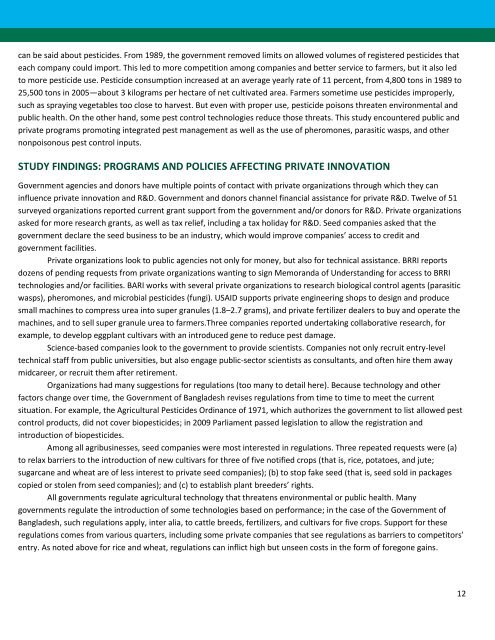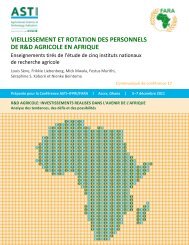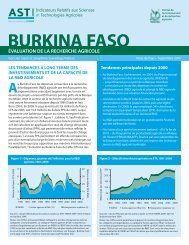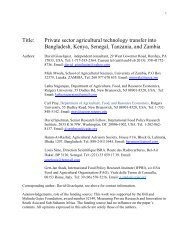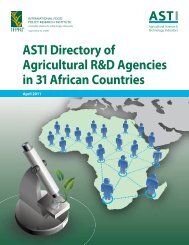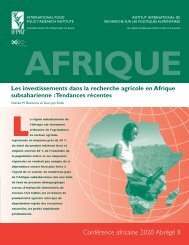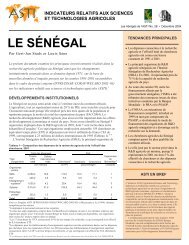Bangladesh country report - ASTI - cgiar
Bangladesh country report - ASTI - cgiar
Bangladesh country report - ASTI - cgiar
Create successful ePaper yourself
Turn your PDF publications into a flip-book with our unique Google optimized e-Paper software.
can be said about pesticides. From 1989, the government removed limits on allowed volumes of registered pesticides that<br />
each company could import. This led to more competition among companies and better service to farmers, but it also led<br />
to more pesticide use. Pesticide consumption increased at an average yearly rate of 11 percent, from 4,800 tons in 1989 to<br />
25,500 tons in 2005—about 3 kilograms per hectare of net cultivated area. Farmers sometime use pesticides improperly,<br />
such as spraying vegetables too close to harvest. But even with proper use, pesticide poisons threaten environmental and<br />
public health. On the other hand, some pest control technologies reduce those threats. This study encountered public and<br />
private programs promoting integrated pest management as well as the use of pheromones, parasitic wasps, and other<br />
nonpoisonous pest control inputs.<br />
STUDY FINDINGS: PROGRAMS AND POLICIES AFFECTING PRIVATE INNOVATION<br />
Government agencies and donors have multiple points of contact with private organizations through which they can<br />
influence private innovation and R&D. Government and donors channel financial assistance for private R&D. Twelve of 51<br />
surveyed organizations <strong>report</strong>ed current grant support from the government and/or donors for R&D. Private organizations<br />
asked for more research grants, as well as tax relief, including a tax holiday for R&D. Seed companies asked that the<br />
government declare the seed business to be an industry, which would improve companies’ access to credit and<br />
government facilities.<br />
Private organizations look to public agencies not only for money, but also for technical assistance. BRRI <strong>report</strong>s<br />
dozens of pending requests from private organizations wanting to sign Memoranda of Understanding for access to BRRI<br />
technologies and/or facilities. BARI works with several private organizations to research biological control agents (parasitic<br />
wasps), pheromones, and microbial pesticides (fungi). USAID supports private engineering shops to design and produce<br />
small machines to compress urea into super granules (1.8–2.7 grams), and private fertilizer dealers to buy and operate the<br />
machines, and to sell super granule urea to farmers.Three companies <strong>report</strong>ed undertaking collaborative research, for<br />
example, to develop eggplant cultivars with an introduced gene to reduce pest damage.<br />
Science-based companies look to the government to provide scientists. Companies not only recruit entry-level<br />
technical staff from public universities, but also engage public-sector scientists as consultants, and often hire them away<br />
midcareer, or recruit them after retirement.<br />
Organizations had many suggestions for regulations (too many to detail here). Because technology and other<br />
factors change over time, the Government of <strong>Bangladesh</strong> revises regulations from time to time to meet the current<br />
situation. For example, the Agricultural Pesticides Ordinance of 1971, which authorizes the government to list allowed pest<br />
control products, did not cover biopesticides; in 2009 Parliament passed legislation to allow the registration and<br />
introduction of biopesticides.<br />
Among all agribusinesses, seed companies were most interested in regulations. Three repeated requests were (a)<br />
to relax barriers to the introduction of new cultivars for three of five notified crops (that is, rice, potatoes, and jute;<br />
sugarcane and wheat are of less interest to private seed companies); (b) to stop fake seed (that is, seed sold in packages<br />
copied or stolen from seed companies); and (c) to establish plant breeders’ rights.<br />
All governments regulate agricultural technology that threatens environmental or public health. Many<br />
governments regulate the introduction of some technologies based on performance; in the case of the Government of<br />
<strong>Bangladesh</strong>, such regulations apply, inter alia, to cattle breeds, fertilizers, and cultivars for five crops. Support for these<br />
regulations comes from various quarters, including some private companies that see regulations as barriers to competitors’<br />
entry. As noted above for rice and wheat, regulations can inflict high but unseen costs in the form of foregone gains.<br />
12


